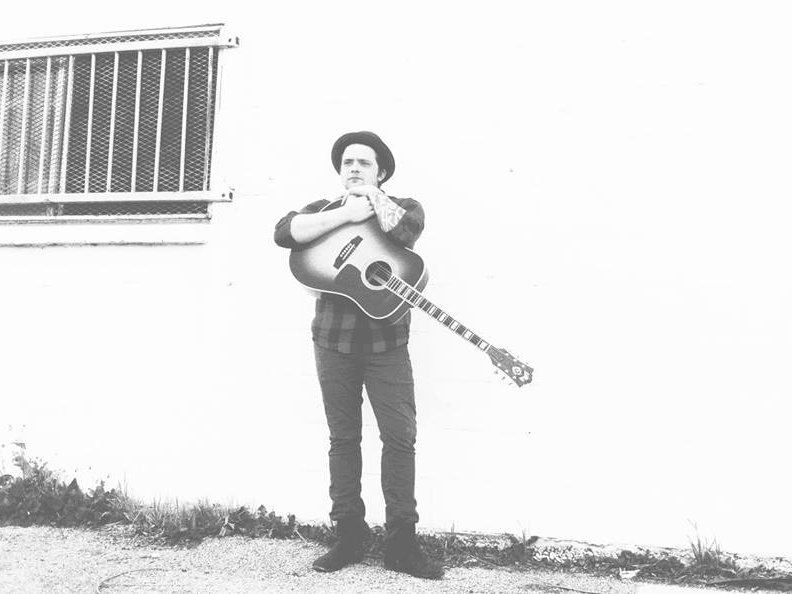Folk country singer Christopher Denny talks a lot about things in twos and especially the idea of bridging two seemingly polar opposites. It makes sense since Denny himself is a fascinating amalgam of seemingly disparate elements.
When you first see him, with his arm of tattoos, and hear of his difficult, self-destructive past of drugs and alcohol now behind him, one expects his music and voice to have a certain sound. Yet when he begins singing, Denny sounds like someone completely unexpected, someone with a Southern twang almost from another era. Mixing a honest throwback traditional sound with equally honest lyrics and raw emotions, Denny is certainly a unique specimen in the increasingly sanitized pop world of country.
Denny's road to recovery and stardom now brings him to Milwaukee, where he will perform with Strand of Oaks at Turner Hall on Monday, Aug. 18. Before that show, however, OnMilwaukee.com got a chance to chat with Denny about his music, his past battles with addiction and why they stopped making country music around 1995.
OnMilwaukee.com: When did you first get into music?
Christopher Denny: My whole life. I’ve really, really loved playing and idolized the man with his guitar, you know? So I’d say probably like about when I was four years old. When I was at three or four, I knew the words to full songs. My dad let me listen to a little jukebox, and we have video footage of me with a cowboy hat and boots, singing "Gimme Three Steps" by Lynyrd Skynyrd. It was so funny.
I really started to play and take myself seriously when I was around 14 or 15. Toward the end of high school, I thought this is what I really want to do.
OMC: Was this always the sound you wanted to go for, this almost throwback country-style music?
CD: Yeah man, it is. I had a hard time at first, knowing I’ve got to be natural, and I’ve got to be who I am. I don’t think I was looking for a unique voice; I think I was looking to be absolutely myself. And those things went hand in hand, and that was the blessing that I was given.
I will say that playing the guitar came very natural. The first day I got my guitar at 14, I looked up all the chords on the Internet, and I was able to sing and play them at the same time within about 30 minutes. That was another thing that helped me, that was a blessing.
If the stuff coming out – being natural to myself – would have been a bluesy thing, like straight delta blues, well then I’d be playing that. It just came natural to me. The funny thing is these things are like the melting pot. There’s so much beauty in a person, for instance, who’s a real American, and what’s a real American to me is a mixture of every country. I could’ve been a melting pot of terrible voices, but that’s once again one of those blessings.
OMC: Your music, you kind of dubbed it this "Arkansas soul." What’s in the melting pot of that sound?
CD: At this point, that description was something we were talking about, and there seems to be two sets … or everything comes in twos in this whole situation. You’ve got the Chris that totally abused drugs and probably never would’ve picked up for an interview like this and was never reachable. Then you’ve got the Chris who’s on his game.
Then, speaking of twos, you’ve got people in Little Rock who are mad that I left Little Rock and sort of hate on me. Those are bitter people. And then you’ve got people who are pushing me and saying, "I want this for you." You’ve got all of these things in twos in there, and my job now, as a person who has been getting his life back, is to find that in-between place in between all of these to see both sides. There are some times you don’t go over to one side because there’s too much bitterness and negativity, but for the most part in my life, I want to be in between these things.
That’s where the soul part comes from: being true to yourself. We don’t necessarily mean that this is soul music. It just means that if I tried to, I could not pull the Arkansas out of my voice and music. The other thing is Arkansas is one of those places that people don’t really know all the much about for the most part. Geographically, it’s like, "Is that the West? Is that the Midwest? Is that the South?" The feeling being there is exactly the same, and I want to bring home that I’m a son of Arkansas and most of that is who I am and what you hear in the music.
OMC: You’re very honest and upfront about your past with drugs and alcohol. Is it ever hard to talk about that part of your life?
CD: It’s not hard at all; it gets boring. My thing was that I realized that you don’t have to do that whole extreme thing. For me, there’s two: There’s sober and there’s completely f*cked up, and for me, it’s like I want somewhere in between. That doesn’t mean I’ll dabble in hard drugs. It just means that there are times when I’ll tell people, "Maybe someday we’ll go fishing and grab a beer." That day may never come, but I don’t have to sit there and talk like it never could.
I’m on this whole thing about things in twos and building a bridge between the two things for people to discover. And it comes out in my music, not just in the lyrics but in the voice and the guitar. These things come out, being a bridge, like not being a pacifist and not being a war supporter but being a person who makes decisions in the moment but not irrationally. That’s the whole thing with Arkansas soul and sobriety and with the relationship with the record label and my booking agent and my wonderful manager JT.
People want to ask me all these different questions about drugs. "When exactly did you quit this, this or this?" or negative questions about my past. You don’t get mad; you don’t say, "Oh, the fairy tale princess brought me some cocaine last week." You make a positive effort to swing a question in another direction.
OMC: Absolutely. I’m sure you’re trying to move forward on some level, and to answer the same five or six questions is just going back to negatives.
CD: Exactly.
OMC: How do you feel about the state of country music right now?
CD: I think it’s amazing. I can’t believe they stopped making it around 1995. (laughs) I can’t believe they did away with the whole genre of music and stopped making country music. I mean it’s good for some people that they started making pop music in Nashville.
OMC: Yeah, that seems to be the direction it’s going in.
CD: My theory is that I love that music so much, that older music. I love Clint Black and Dwight Yoakam and all that stuff from the early ’90s, but I don’t look at it like, "Aw man, they’ve changed country music!" That’s giving them too much credit. Country music might not necessarily exist and never will again, and that’s a historic and beautiful thing we’re looking at. It’s like Shakespeare, you know? This is it.
For me, don’t go trying to bring it back. I’m not going out there and waste their time and my time together to get on the radio and save country music. Country music doesn’t need a savior necessarily. Here’s the thing I can’t stand: I can’t stand these throwback bands that are basically playing like they think they’re in the ’50s. It’s like being an Elvis impersonator. There’s this nostalgia thing going on, and I don’t want that. I don’t mind it, but I don’t want to be mistaken for that.
There are too many A&R guys and record execs that are very confused and think stuff like "This guy is the next Johnny Cash," instead of "This guy should be called by his own name if he’s that special." The other thing is if he is the next Johnny Cash, then why not start a record label for impersonators. The truth is some truly talented child will see this and aspire to be just like someone instead of being themselves.
OMC: Yeah, I’ve talked to a lot of bands who say they want to create songs that are timeless, which seems like a difficult thing to do in the present.
CD: It’s hard if you say you want to. You don’t want to have a timeless sound; you don’t do that. That’s not proper. You have a sound, and if you’re true and you’re honest, it becomes timeless. What is timeless? Things that people can hold onto to help them when they hurt. Medicine for the soul. How do you want something like that? You have to have the disease to want the cure.
OMC: You had a new album come out on the 5th, and what was something you really wanted to improve upon on this new album from your last one? From your bio, it sounds like you were, maybe not displeased with that album, but that you wanted to grow.
CD: Yeah, I think there was a big part of me that wanted what we just talked about. I think I just learned what I just explained in the last question; that’s a lesson that I’ve learned in between albums. So what you’re hearing is a natural transition that I’m consciously aware of.
As much as it is a gigantic cliché to say that one has always had a passion for film, Matt Mueller has always had a passion for film. Whether it was bringing in the latest movie reviews for his first grade show-and-tell or writing film reviews for the St. Norbert College Times as a high school student, Matt is way too obsessed with movies for his own good.
When he's not writing about the latest blockbuster or talking much too glowingly about "Piranha 3D," Matt can probably be found watching literally any sport (minus cricket) or working at - get this - a local movie theater. Or watching a movie. Yeah, he's probably watching a movie.







